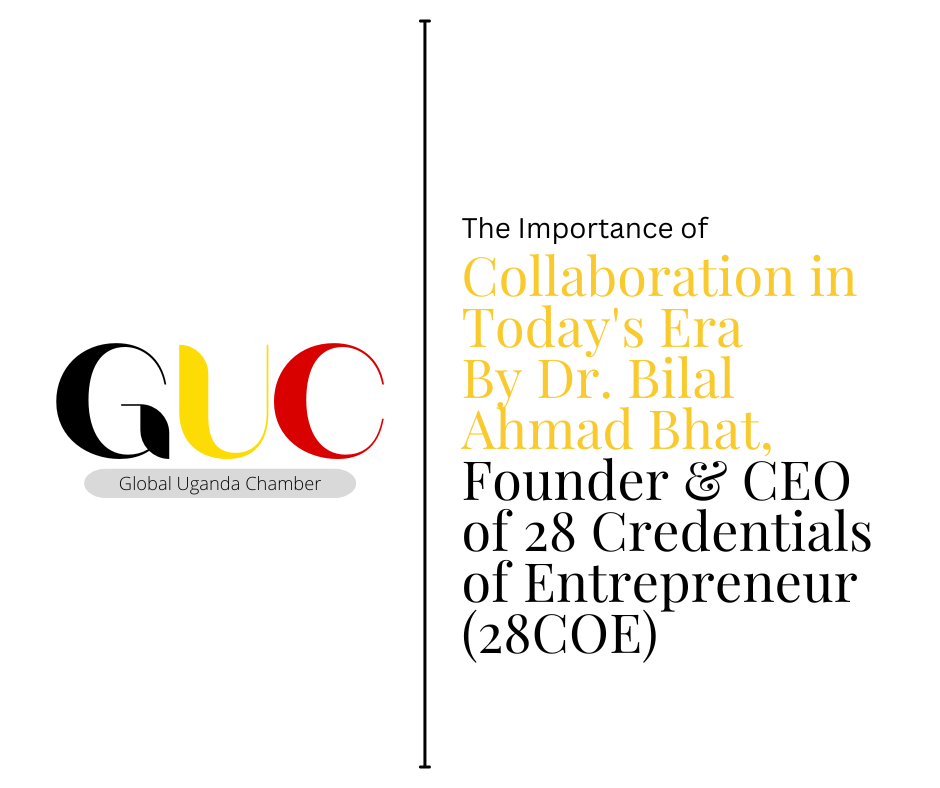In today’s fast-paced and interconnected world, collaboration has become an essential element for success. Dr. Bilal Ahmad Bhat, the founder and CEO of 28 Credentials of Entrepreneur (28COE), has always believed that success does not arise from isolated efforts, but from the power of collaboration. While this concept has often been associated with large corporations, Dr. Bhat emphasizes that it is equally important for small and medium-sized enterprises (SMEs), which are the backbone of economies around the globe. In fact, growth in today’s era is inextricably linked with collaboration.
The Power of Collaboration for Business Growth
The digital transformation and the rise of globalization have led to an unprecedented level of interconnectedness across industries and countries. In this environment, businesses, regardless of size, cannot afford to operate in silos. Collaboration allows companies to leverage each other’s strengths, overcome challenges, and innovate in ways that would not be possible individually. For SMEs, collaborating with other businesses can provide access to resources, technology, expertise, and networks that are crucial for survival and growth.
Dr. Bhat’s vision for entrepreneurship goes beyond profits and revenue. He believes that collaboration is key to creating a sustainable and thriving business ecosystem. When companies come together, they share knowledge, reduce risks, and tap into new markets. This collaborative mindset fosters an environment where businesses can learn from each other, adopt best practices, and innovate more effectively, driving growth that benefits not only the companies involved but the broader economy as well.
Collaboration: Not Just for Big Corporations
While collaboration has traditionally been seen as a strategy for large corporations, Dr. Bhat’s perspective shifts the focus to include SMEs. Many small businesses often lack the resources to compete with larger, more established players. However, through collaboration, these smaller companies can join forces to compete at a higher level. Whether through joint ventures, strategic partnerships, or shared supply chains, SMEs can pool their resources to overcome challenges and accelerate growth.
In today’s competitive market, collaboration is no longer a luxury; it is a necessity. It is no longer enough for businesses to work in isolation and rely solely on internal resources. Collaborating with others—be it through strategic partnerships, industry alliances, or even informal networking—can open doors to new opportunities that can propel a business forward.
Collaboration as a Tool for Nation-Building
Dr. Bhat’s understanding of collaboration extends far beyond the world of business. As a global icon and a former candidate for the Legislative Assembly elections in Jammu and Kashmir in 2024, Dr. Bhat believes that collaboration is an essential tool for nation-building. Just as businesses grow through collaboration, nations too thrive when people work together toward a common goal.
In the context of Jammu and Kashmir, Dr. Bhat’s vision is rooted in the idea that development can only occur when there is cooperation between various sectors of society: the government, businesses, civil society, and the people themselves. Collaboration at all levels—whether local, regional, or national—can bridge divides, create mutual understanding, and lead to sustainable growth and development.
For Dr. Bhat, collaboration is not just about achieving business success or political gains; it is about building a better future for all. In a world that is increasingly facing challenges such as climate change, economic disparity, and social unrest, collaboration can serve as a powerful tool for addressing these issues. By working together, individuals, communities, businesses, and governments can find innovative solutions that benefit society as a whole.
The Role of Technology in Facilitating Collaboration
Technology has played a pivotal role in making collaboration easier and more efficient. The rise of digital platforms, communication tools, and project management software has enabled businesses to collaborate across geographical boundaries and time zones. This has opened up new possibilities for partnerships and cooperation, making it easier for SMEs to engage with global markets.
For Dr. Bhat, embracing technology is an integral part of fostering collaboration. The tools that are now available allow businesses to communicate, share information, and collaborate in real-time, regardless of their location. Technology has made it possible for even small businesses to access global markets, collaborate with partners across the world, and innovate at scale. In this digital age, collaboration is no longer limited by borders or resources; it is only limited by creativity and vision.
The Future of Collaboration: A Call to Action
Looking ahead, Dr. Bhat sees collaboration as a central theme in shaping the future of both business and society. The next generation of entrepreneurs and leaders must recognize the importance of collaboration and work to create environments that foster cooperation and mutual growth. Whether it’s through partnerships with other businesses, community-driven initiatives, or international collaborations, the opportunities for growth through collaboration are endless.
In conclusion, Dr. Bilal Ahmad Bhat’s belief in the power of collaboration is not just about growing businesses; it’s about growing economies, building nations, and fostering a culture of innovation, inclusion, and mutual respect. For businesses—especially SMEs—success today is not about working alone but about working together. The power of collaboration will not only help businesses thrive but will also contribute to the development of strong, resilient, and interconnected societies.
As we move forward, let’s remember that in a world where challenges are increasingly complex, the key to overcoming them lies in our ability to collaborate. Whether you are an entrepreneur, a business leader, or a citizen, it is time to recognize the importance of collaboration in shaping the future.





1 Comment
[…] Switching jobs can be a strategic move to advance your career, but timing is critical. The current job market is characterized by rapid change, and opportunities may be fleeting. Are you prepared to act swiftly and decisively to capitalize on these openings? […]